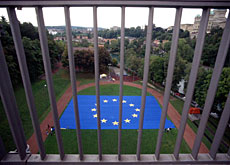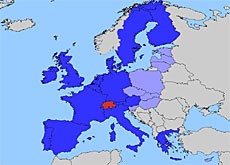Swiss count cost of isolation

Ten years after Switzerland voted against joining the European Economic Area (EEA) arguments continue to rage over the merits of the decision.
Supporters of closer integration with Europe claim that by rejecting membership, the Swiss economy was left lagging behind many of its competitors.
In an interview with the weekly “NZZ am Sonntag”, the Swiss foreign minister, Joseph Deiss, said Switzerland had chosen a “slow and difficult path” when it voted against joining the EEA.
“Joining the EEA would have allowed Switzerland to make important steps toward liberalisation. Instead Switzerland has fallen behind,” he said.
Before the vote on December 6 1992, an emotionally charged campaign saw supporters of EEA membership claiming that a “no” vote was essentially economic suicide.
Opponents, for their part, believed that voting against the EEA was the only way for Switzerland to survive the new European landscape.
In the event, the outcome of the vote conformed to the usual pattern: the German-speaking Swiss largely came out against membership while the more Euro-friendly French-speakers voted in favour.
Weak performance
Since 1992, Switzerland’s economic performance has undoubtedly been worse than that of its European neighbours.
From 1992 to 2001, Switzerland had the weakest growth rate in western Europe, coming in at a meagre 1.1 per cent.
Income growth has also fallen over that period in contrast to neighbouring Austria, for example, which shares many similarities with the Swiss economy. There per capita income rose 16 per cent during the 1990s (although average incomes are still higher in Switzerland).
Fifteen years ago, Austria lagged behind Switzerland in terms of foreign trade. But by 1999, the country’s exports had surpassed those of Switzerland by six per cent. And during the mid-1990s, unemployment in Austria was lower than in Switzerland.
Some suggest that Austria’s relative success is down to Vienna’s decision in the 1990s to join the EEA and the European Union.
Franz Jäger, economics professor at the University of St Gallen, believes EEA membership put Austria under strong competitive pressure to improve its economy. This, in turn, led to a much-needed increase in production.
Too expensive
Although Switzerland’s foreign trade performance has improved, weak domestic markets continue to be a problem, driving up prices, says Jäger.
In Switzerland rental costs are higher than in any other western European country because of high land prices. Yet the cost of borrowing money, in the form of real interest rates, is similar to that of other European countries.
Whether staying out of the EEA has been the cause of Switzerland’s lacklustre economic performance is a moot point.
Serge Gaillard, an economist and general-secretary of the Swiss Trades Union Federation, denies that rejection of EEA membership had any direct negative consequences for the Swiss economy.
Austerity policies
He blames the Central bank’s restrictive monetary policies and the austere budgetary policies implemented by the federal, cantonal and city governments for the weak years of the 1990s.
He also makes the point that, since Switzerland entered into a series of bilateral agreements with the EU on June 1, it has secured largely unfettered access to EU markets. This nullifies the economic arguments for EEA membership, he says.
For Bernd Schips, head of economic research at the Federal Institute of Technology in Zurich, joining the EEA would have brought indirect benefits for Switzerland, most notably by providing an impetus to liberalise its markets.
“The process of economic integration is a engine for reform for both Europe and Switzerland,” he says.
But Schips agrees with Gaillard that not all of Switzerland’s economic woes can be blamed on the decision to stay out of the EEA. Both take the view that the collapse of Swissair, for example, would have happened either way.
Collapse
The collapse of the reputations of some of the EEA’s strongest advocates has also done their cause no good.
Matthias Kummer, former director of the Society for the Promotion of the Swiss Economy, which was responsible for the “yes” to EEA campaign, says many business leaders who advocated EEA membership have seen their credibility vanish.
“The protagonists at Swissair and ABB, who are now out of the picture, are some of people that come to mind,” he says.
One thing is clear: by staying out of the EEA and the EU, Switzerland has had to find an alternative to secure market access to Europe. This has taken the form of the bilateral agreements, and negotiations for a second round are currently in the works.
swissinfo, Jean-Michel Berthoud (translated by Karin Kamp)
Since 1992, Swiss economic performance has lagged behind that of its neighbours.
Many economists believe integration has provided a spur for countries to modernise their economies, and by remaining isolated Switzerland dragged its feet.
Others say Switzerland’s poor performance in the 1990s had more to do with restrictive monetary policies.

In compliance with the JTI standards
More: SWI swissinfo.ch certified by the Journalism Trust Initiative










You can find an overview of ongoing debates with our journalists here . Please join us!
If you want to start a conversation about a topic raised in this article or want to report factual errors, email us at english@swissinfo.ch.